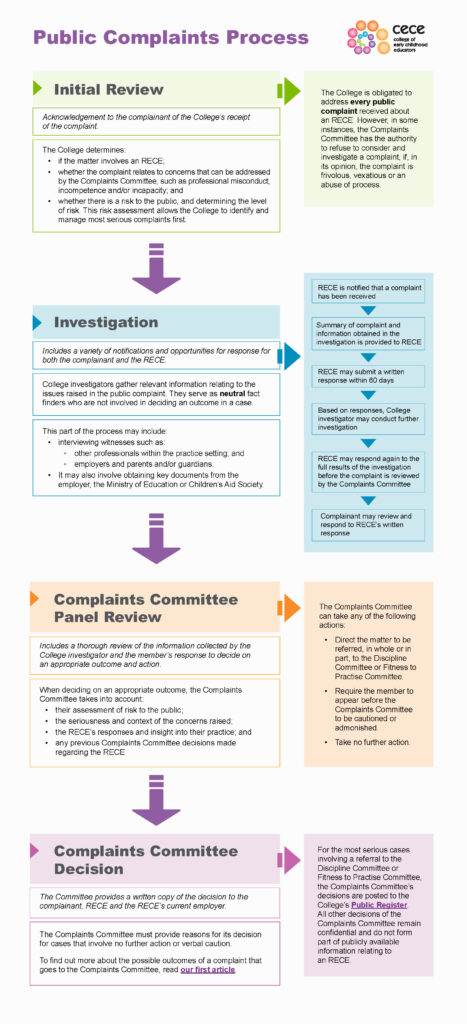In March, we kicked off a series to demystify the College’s complaints process. The first article talked about the different types of complaints that the College receives (public complaints, Mandatory Employer Reports (MER) and Registrar’s complaints) and the process the College follows to address them, and provided information on your rights as a member, along with relevant resources to support your practice.
In the second article, we took a closer look at what happens when MERs and Registrar’s complaints are submitted, and how the College manages cases deemed low-risk to the public.
In this article, we’ll explore the process for public complaints, and explain the work of the Complaints Commitee.
What is a Public Complaint?
A public complaint happens when parents, family members, colleagues or others within a practice setting formally express concern about the conduct or actions of an RECE. Public complaints represent a small portion of complaints addressed by the College; In 2023, of the 691 new complaints opened, 8% were public complaints.
The Early Childhood Educators Act, 2007 (ECE Act) ensures there is a process to address complaints about an RECE and that there is fairness to the RECE throughout the process. The ECE Act requires that:
- public complaints cannot be sent anonymously and must be made in writing or in a permanent form (typically they’re submitted to the College through a Complaint Intake Form);
- the complaints process is confidential: the College cannot confirm or deny the status of any ongoing investigations to any party other than the complainant or RECE involved in the complaint, and that only certain outcomes will form part of publicly available information about an RECE on the public register;
- the College makes a final decision on the complaint within a certain time frame; and
- in the event of a delay, the College is obligated to provide a written notice of the delay to the complainant and notify the RECE with an anticipated time frame in which the decision of the complaint will be made.
What happens once the College receives a complaint from a member of the public?
Click the image to learn more.
The Complaints Committee explained: Who they are and what they do
The Complaints Committee is a screening committee, which means it does not determine whether an RECE is guilty of professional misconduct or incapacitated.
The Complaints Committee:
- has the authority to investigate and consider complaints;
- reviews and examines the information gathered during the investigation and determines what action to take in the public interest; and
- works in smaller groups called Panels. Each Panel is comprised of both elected Council Members (who are RECEs) and Public Appointed Council members.
Neither the complainant or the RECE attend the Complaints Committee meeting.
What are the possible outcomes of a complaint that goes to the Complaints Committee?
The ECE Act sets out the types of decisions the Complaints Committee can make.
- Referral for a hearing
In higher-risk cases involving more serious concerns, the matter may be referred to the College’s Discipline or Fitness to Practise Committee for a hearing. (We will have a deeper dive into the College’s Committees in future articles).
- Verbal caution
A verbal caution, the most common outcome in moderate-risk cases, is educational rather than punitive. A member of the Complaints Committee will explain the concerns about the RECE’s conduct or practice and include reminders of their professional obligations and recommendations to help the RECE improve their practice and avoid similar concerns in the future.
- Remedial education
In low to moderate risk cases, the Committee can require the RECE to complete a Specified Continuing Education or Remedial Program (“SCERP”) to enhance their professional practice
- No further action
For low-risk complaints with no public protection concerns, the Committee may decide to take no further action
The Committee must provide written reasons for its decision to the RECE, the complainant or reporting employer, and the current employer.
What are your rights if there’s a complaint against you?
When an RECE is notified of a complaint against them, it can be stressful and trigger a range of emotions such as shock, anger, fear, and a need to defend themselves. These emotions can be overwhelming. Knowing that you have procedural rights may help reduce this stress.
You have the right to:
- An impartial investigation: No person investigating the complaint has any involvement in the complaint. They are neutral fact finders and seek to only gather the relevant information.
- Receive the results of the investigation: You will be provided with the results of the investigation prior to a decision being made.
- Provide a response to the complaint: You have the opportunity to provide a written response as part of the investigation, both at the outset and completion of an investigation. This is your chance to offer your side of the story.
- Have the investigation completed within a reasonable amount time: The College endeavours to complete the investigation within a reasonable time period and will provide updates on the status of the investigation to both the complainant and the RECE involved in the complaint.
- Seek legal assistance. You may wish to retain legal counsel to assist you and provide advice on how to respond to the complaint. The College investigator or College staff cannot provide you with advice on how best to respond to a complaint.
- A Complaints Committee free from conflict of interest: Consideration of the investigation results by a Complaints Committee comprised of practising RECEs and members of the public who are free from any conflict of interest.
- A written decision: A formal, written decision of the Complaints Committee so that you know why the Committee reached their decision.
One way the College protects the public is by proactively supporting RECEs in their practice with a variety of tools and resources, to help prevent problems before they arise.
Stay tuned for our next article that will focus on high-risk cases, explain more about the Discipline and Fitness to Practise Committees, and provide tips on how RECEs can respond to complaints.
Check out past articles of this series:
- Understanding Complaints, Your Rights and Resources
- Understanding Complaints: Mandatory Employer Reports and Registrar’s Complaints


